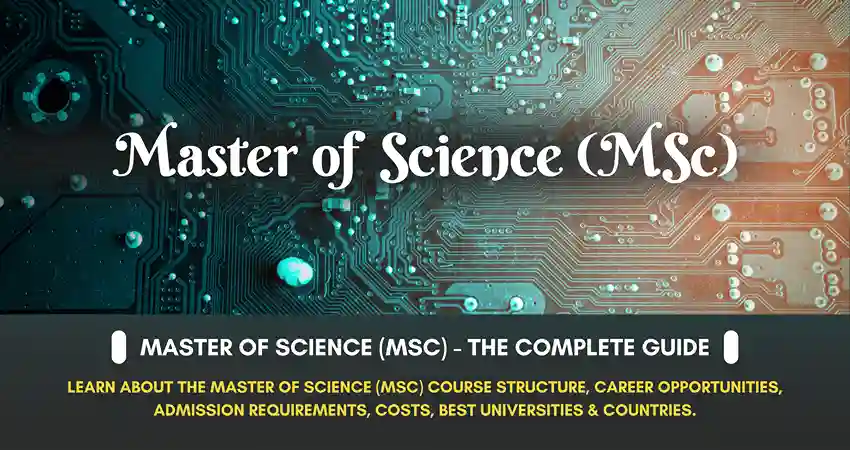The Master of Science (MSc) degree is one of the most sought-after postgraduate qualifications worldwide, particularly in the fields of science, technology, engineering, mathematics (STEM), business analytics, and health sciences. With its research-driven and technical focus, the MSc is the ideal degree for students aiming to develop analytical, quantitative, and problem-solving expertise in high global demand.
This guide provides information on course structure, admission requirements, top universities, the best countries to study in, costs, and career outcomes, with updated 2026 data for international students.
Table of Contents
ToggleWhat is a Master of Science (MSc)?
An MSc degree is a postgraduate qualification that focuses on scientific, mathematical, or technical disciplines. Depending on the university and program, it’s offered in taught (coursework) or research formats.
Key highlights:
- Duration: One year (UK taught) or two years (many other countries)
- Focus: Scientific research, quantitative analysis, and applied learning.
- Popular fields: Computer science, data science, engineering, mathematics, biotechnology, physics, environmental science, business analytics, and psychology.
- Outcome: High employability in global industries, research pathways, or doctoral programs
Master of Science (MSc) Course Structure & Learning Style
- Core Modules: Advanced subject-specific knowledge (e.g., Machine Learning, Structural Engineering, Financial Modelling)
- Elective Modules: Specialized skills to tailor your degree (e.g., AI ethics, Renewable Energy Systems, Neuropsychology)
- Practical Components: Lab work, coding projects, simulations, case studies
- Assessment: Research reports, programming assignments, technical projects, presentations, and exams
- Dissertation/Final Project: 10,000–20,000 words or equivalent applied project based on original research
Who Should Study an Master of Science (MSc)?
An MSc is ideal for:
- STEM graduates seeking deeper technical expertise
- Working professionals aiming to upskill in high-demand areas like AI, data analytics, or engineering design
- Aspiring researchers planning to move into a PhD
- International students wanting a globally competitive, specialized postgraduate degree
Career Paths After an MSc Degree
Popular Roles for MSc Graduates:
- Data Scientist, Machine Learning Engineer
- Civil, Mechanical, or Electrical Engineer
- Research Scientist or Lab Manager
- Environmental Consultant
- Financial Analyst/Quantitative Researcher
- Clinical Psychologist (must be licensed)
High-growth sectors are hiring MSc graduates.
- Technology and IT (AI, cloud computing, cybersecurity)
- Engineering and Construction
- Financial Services and Risk Analysis
- Healthcare and Biotechnology
- Renewable Energy and Environmental Science
Admission Requirements for MSc Degree
- A bachelor’s degree in a relevant field is required. A 2:1 or equivalent is preferred.
- Academic transcripts and degree certificate.
- A Statement of Purpose (SOP) that explains your career goals.
- Letters of recommendation (usually two)
- Proof of English proficiency (IELTS, TOEFL, Duolingo, or MOI, depending on university policy).
- A CV or resume showcasing relevant experience
- Portfolio (for fields such as design, architecture, or applied technology projects).
The cost of an MSc degree
- For international students in the UK: £10,000–£32,000 per year.
- Scholarships: Chevening, Commonwealth, GREAT Scholarships, and university-specific awards
- Living costs in the UK are £10,000–£15,000 annually (higher in London).
Always verify tuition and requirements on the official university website, as they change yearly.
Best UK Universities for MSc Degree
Based on Times Higher Education 2026 & QS World Rankings for science, tech, and engineering fields:
- University of Oxford
- University of Cambridge
- Imperial College London
- University College London (UCL)
- University of Edinburgh
- King’s College London
- University of Manchester
- University of Warwick
- University of Glasgow
- University of Southampton
The entry requirements, accepted English tests, and tuition fees vary by course. Please confirm these details directly with the university or consult STS Global Education.
Best Countries for an MSc Degree
United States
The USA is home to top-ranked universities and offers excellent opportunities, particularly in STEM fields. The country has a robust job market and allows international students to work after graduation.
A key advantage for international students is that they only pay tuition fees after receiving visa approval, which reduces the stress of applying for a tuition fee refund if the embassy doesn’t approve the visa — ideal for students from South Asia and Africa.
All applicants must attend a U.S. embassy interview, which plays a significant role in visa approval. Maintaining good academic standing, demonstrating genuine intent, and communicating clearly greatly improves success rates.
Overall, the USA offers a world-class education, global industry connections, and prestigious universities, making it one of the best choices for Master of Science (MSc) students worldwide.
United Kingdom
The UK is a popular destination for MSc students. It is known for its one-year master’s programs, world-renowned universities, and robust industry connections.
Students benefit from flexible post-study work opportunities under the Graduate Route, which allows them to stay and work for up to two years after graduation.
With its prestigious institutions, high academic standards, and diverse, multicultural environments, the UK offers an excellent balance of quality education and career advancement, making it a top choice for international MSc students.
Canada
Canada is a top destination for master’s students thanks to its excellent education system, affordable tuition, and pathways to permanent residency.
Canadian universities emphasize research and innovation, particularly in STEM and technology fields. Students can gain valuable work experience through co-op programs during or after their studies.
With its safe environment, welcoming immigration policies, and diverse cultural atmosphere, Canada offers international MSc students academic excellence and long-term career opportunities, making it an ideal choice.
Germany
Germany is one of the most affordable destinations for MSc students, as public universities offer low or no tuition fees. It is known for its strong programs in engineering, technology, and research, offering a perfect blend of academic excellence and practical industry experience.
Many MSc programs are taught in English, and students benefit from close collaboration with global companies through internships and research projects.
Thanks to its world-class education, innovative environment, and affordable living costs, Germany is an excellent choice for international students seeking a high-quality, cost-effective MSc experience.
Australia
Australia is a popular destination for Master of Science (MSc) students, offering high-quality education and globally recognized degrees in a vibrant, multicultural environment. Its universities are renowned for their robust research programs and close partnerships with industry, particularly in engineering, information technology (IT), healthcare, and environmental sciences.
International students can benefit from post-study work opportunities ranging from two to four years, which allow them to gain practical experience and explore pathways to permanent residency.
Due to its excellent academic standards, safe environment, and career-focused programs, Australia remains a top choice for MSc students seeking education and long-term opportunities.
France
France is an up-and-coming destination for international Master of Science (MSc) students, offering world-class education, innovative research opportunities, and globally recognized degrees. Its universities and grandes écoles are renowned for their academic excellence in fields such as engineering, business, data science, and environmental studies.
Ireland
Ireland is one of Europe’s fastest-growing destinations for studying abroad. It offers world-class MSc programs that are recognized globally for their academic excellence and industry relevance. Irish universities are renowned for their strong connections with leading global companies, particularly in technology, business, engineering, and life sciences.
Netherlands
The Netherlands is a leading hub for international education, offering MSc programs that are recognized worldwide and taught entirely in English. Dutch universities are renowned for their innovation, research excellence, and practical approach to learning, particularly in the fields of engineering, data science, business, and environmental studies.
Spain
Spain is an emerging destination for international Master of Science (MSc) students, offering high-quality education, globally recognized degrees, and an affordable lifestyle. Spanish universities emphasize innovation, research, and real-world skills in fields such as business, engineering, data science, and health sciences.
Sweden
Sweden is one of Europe’s top destinations for master’s degree studies. It is known for its innovation, sustainability, and world-class education system. Swedish universities emphasize research-based learning, creativity, and collaboration with global industries, particularly in the fields of engineering, technology, and life sciences.
How to Choose the Right MSc Program
- Match program modules with your career goals (industry vs research focus).
- Check accreditations (e.g., IMechE, IET, BCS for engineering/computing)
- Compare location, costs, and post-study work visa options.
- Look at faculty expertise and industry links.
- Explore scholarships and funding opportunities.
Are you overwhelmed by deciding which country, university, subject, or city to choose? Contact STS Global Education.
With 13 branches in seven countries and over 100 expert counselors, we serve areas where we do not have a physical presence as well. We have helped over 50,000 students achieve their academic goals. Let us help you find the perfect Master of Science (MSc) program in the UK.




